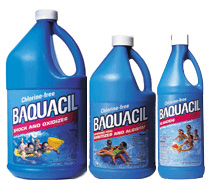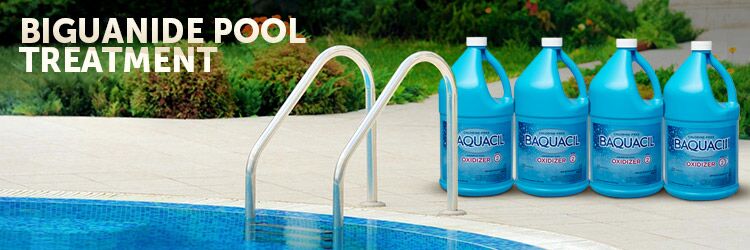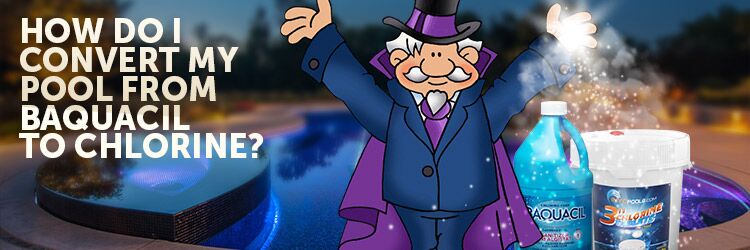There is some talk within the pool industry questioning the legitimacy of biguanide chemicals. Are biguanide chemicals as effective as chlorine? Is it truly an acceptable alternative for pool owners who do not like using chlorine?
What are Biguanides?
 Biguanide, or as the science elite say polyhexamethylene biguanide (PHMB), was originally designed as a surgical scrub disinfectant. In short, it acts as a sanitizer. Biguanide is one of the only non-halogen chemicals approved for sanitation by the Environmental Protection Agency (EPA). Biguanide is, in fact, a sanitizer. There’s no debate about that. If you wanted to use biguanide to clean your swimming pool, or surgical gear apparently, you can. The question is, is it a viable replacement sanitizer for chlorine? Does it produce all of the same benefits that chlorine yields? Should you be using it in your pool instead of chlorine?
Biguanide, or as the science elite say polyhexamethylene biguanide (PHMB), was originally designed as a surgical scrub disinfectant. In short, it acts as a sanitizer. Biguanide is one of the only non-halogen chemicals approved for sanitation by the Environmental Protection Agency (EPA). Biguanide is, in fact, a sanitizer. There’s no debate about that. If you wanted to use biguanide to clean your swimming pool, or surgical gear apparently, you can. The question is, is it a viable replacement sanitizer for chlorine? Does it produce all of the same benefits that chlorine yields? Should you be using it in your pool instead of chlorine?
INYO Pools collectively says NO and here’s why.
How Do Biguanides Work?
First and foremost, biguanides aren’t oxidizers. What that means is that it does not have the capability or chemical stability to break down other contaminants you bring into the pool such as your body oils, body waste, perspiration, or any other chemicals that your body releases once inside your pool. In addition to biguanide, pool owners need to purchase an additional oxidizer such as hydrogen peroxide to kill the extra contaminants. I don’t know about you but we prefer not to swim in a pool full of body sweat and lotions. Biguanides break through bacteria’s cell walls and cause them to burst from within. Then, the particles are wrapped in a gel-like substance that eventually sinks to the bottom of your pool.
Benefits of Using Biguanides
So what exactly do biguanides bring to the table, or pool rather, that chlorine doesn’t? For one- money. Using a biguanide, like Baquacil, is rather expensive. Generally speaking, pool maintenance isn’t cheap but in comparison to chlorine, even biguanides are pricey. As mentioned before, if you choose the biguanide route, you also have to purchase additional oxidizers. That means more money out of your pocket. One of the true benefits is that, unlike chlorine, it does not break down in high temperatures. Additionally, biguanides do not have a lingering smell and does not erode bathing suits and vinyl liners.
The Downfall of Biguanides
In addition to cost, biguanides also have a tendency to cloud and/or cause foaming. Typically, pool owners aren’t using enough oxidizers to rid the slime and mold problem that’s a by-product of the system. One of the biggest issues with using biguanides is its resistance to microorganisms in the water. Over time, some microorganisms become biguanide-resistant. Usually, shocking your pool is the only way to rid your pool of these microorganisms. However, shocking your pool also destroys all of the biguanide in your water. It’s definitely a lose-lose situation.
Although we’re not huge fans of switching from chlorine to biguanides, there are highly successful pools that use biguanides. Are you one of those pools? Is anyone using a biguanide system in their pool that they love? Let us know.









cheryl florida
I have used Biguanide in my above ground pool for 20 some years. The weather here is very hot in the summer the Biguanide keeps the water in good shape unlike the chlorine which leaches out to quickly. In my opinion it is not any more expensive to use the Biguanide due to fact that I had to purchase twice the amount of chlorine. I test and treat once a week faithfully with sanitizer and oxidizer sometimes extra algicide. No problems to date.
I have been using biguanide products in my above ground pool for almost 35 years. My current pool is 20 years old and the liner is in good shape. I have found the water quality to be much more stabile and easier to maintain than with chlorine, without the terrible smell and harsh effects on swimwear. It’s worth a little more expense to know my pool won’t turn green with a change in the weather.
I have been using Baquacil and Baquacil compatible for 30 plus years. First used it in our above ground and then in our inground. Have had some issues over the years but that was more about keeping the PH balanced, and filtering. I agree with all the benefits above ( no dry skin, eyes, hair and bathing suits last longer, No smell) Just finial had to replace the in-ground pool liner after almost 20 years, we replaced it because of a 5 inch tare in the liner about water line that was there when we open the pool this year. Back in 2012 Sandy hit NJ and my pool was filled with bay water when it came time open and clean pool in March/April of 2013 (even with all the bay water and how black the water was) we were able to get the pool clean and back to swimming condition (had to replace the pump and pool heater after Sandy) and the liner was still in great condition at that time. I give a lot of credit to using the alternate products.
When we bought our house a year and a half ago, it came with a fantastic in ground pool. And no instructions, what so ever! We were not fans of the chlorine, because chlorine is toxic. So we started looking at alternatives and to my scientific brain, hydrogen peroxide made 100% sense. Once I started searching hydrogen peroxide options, I ran across Baquacil, which was a cheaper product than just the 35% hydrogen peroxide.
I don’t follow the Baquacil recommendations to the letter but found what works for us, in our environmental zone and our pool, so it costs much less. We love it and it doesn’t irritate our skin or our eyes. Not only that, but it has cost us a lot less than the chlorine pool did.
We too have been using a biguinide system in our above ground pool for 3 yrs. I agree with everything Linda stated above ☝️
I found year two my water was on the cloudy side. Discovered, as the author explained, we were not using enough “shock” oxidizer. This third year we’ve added “Pool Complete” and I’ve never had more beautiful water. Easy to take care of, no odors or burn. Cost is a slight issue….I was using Baquacil year one and two…however, discovered Biosilk this year and it’s saved us a lot of money ? In short, year one was great. Year two, not so happy (even considered switching systems-very time consuming and costly) and year three, couldn’t be happier.
Is Biosilk from the BioGuard company? Could you post a link for the product? I have been using 35% food grade hydrogen peroxide, and while my levels are typically on target, the pool is cloudy.
I fully agree with Sarah and Linda above. I replaced chlorine with Baquacil 13 years ago and never looked back. I switched chemicals for the sake of my children and grandchildren. I remember during Army boot camp training, for one minute (which seemed like one hour to me), we had to walk through a gas chamber full of chlorine gas…with no mask. We all retched, we were blind for a few minutes: not a fun experience. When I switched chemicals, I had to replace the bleached;liner; chlorine was eating away at the plastic and leaving pinholes. Baquacil does not bleach my grandchildren’s hair,or sting the eyes and lasts far longer than chlorine. Weigh that against the cost difference of the two chemicals and you come out ahead in less work.
Chlorine is a deadly chemical, so why use it if there is a far safer alternative?
John,
You were exposed to CS gas in Army boot, not chlorine gas. If it were chlorine gas, you wouldn’t be writing comments online. Chlorine gas very quickly displaces the air in the lungs and causes permanent damage. This never happened at Army boot, ever. It did, however, happen in WWI and during experiments at concentration camps.
Biguanide is a choice and can work; however, using safety really isn’t the best factor since biguanide has to be use in conjunction with an oxidizer like hydrogen peroxide. Now, hydrogen peroxide is pretty much on the same not-good-for-human-consumption list as chlorine. In higher concentrations, hydrogen peroxide is used to bleach hair among other things. To kill harmful organisms in pool water, time is a thing. Also, clear water can still have bugs.
I switched from using chlorine in my above ground pool to using a biguanide system…I absolutely love the biguanide pool care system. It is so much more gentle on my hair, skin and eyes! Since I switched over I have had a much more easy time keeping everything at good levels. I’m so grateful I was told about this chlorine alternative to pool care
What do you use to close the pool for winter chemicals?
Charlie ,
if my pool water is too saturated is there any other way to balance the chemical’s.